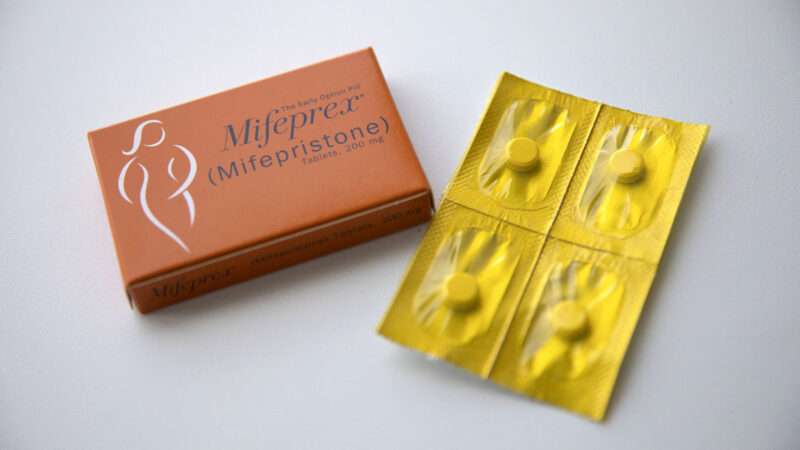
A pair of preliminary decisions from federal judges in different districts have given contradictory instructions to the Food and Drug Administration (FDA) about the abortion-inducing drug mifepristone.
In Texas, U.S. District Judge Matthew Kacsmaryk opined that the FDA erred when it approved mifepristone for early-term abortions back in 2000; he ordered access to the drug to be suspended while a challenge to that approval continues. In Washington state, U.S. District Judge Thomas O. Rice held that federal authorities cannot restrict access to mifepristone, or at least not in the 18 states that filed a lawsuit to protect access to the drug.
In March, these Democrat-led states requested a preliminary injunction "preserving the status quo" by preventing the FDA or the Department of Health and Human Services from taking any action "to make mifepristone less available." Rice granted this injunction on Friday, writing that "it is fair and equitable for FDA to not act with respect to [mifepristone] until a determination is made on the merits" of the case.
The divergent orders from Trump appointee Kacsmaryk and Obama appointee Rice may wind up bringing the battle over abortion pills to the Supreme Court.
The Department of Justice has already appealed the Kacsmaryk ruling, which represents an unprecedented situation in which a single judge could upend FDA approval of a medication. If it stands, it could wreak havoc on the entire system of drug, vaccine, and medical device approvals in the U.S.
The decision "overturns the FDA's expert judgment, rendered over two decades ago, that mifepristone is safe and effective. The Department will continue to defend the FDA's decision," Attorney General Merrick B. Garland declared in a statement, which also noted that the department was reviewing the Washington decision.
"The Court in this case has substituted its judgment for FDA, the expert agency that approves drugs," argued President Joe Biden in a statement. "If this ruling were to stand, then there will be virtually no prescription, approved by the FDA, that would be safe from these kinds of political, ideological attacks."
The potential for such expansive effects is just one of many reasons why Kacsmaryk's decision is alarming. The ruling is rife with what many consider to be errors in legal logic, and it often dips into anti-abortion ideology. For instance, rather than use the term "fetus," Kacsmaryk said it's more scientific to refer to "unborn humans."
Kacsmaryk granted standing to the plaintiffs—the Alliance for Hippocratic Medicine, which includes the Catholic Medical Association and the Christian Medical & Dental Association—even though they are not patients who took mifepristone or doctors who prescribed it, based on the theory that they suffered harm because because "adverse events from chemical abortion drugs can overwhelm the medical system." But the Supreme Court says plaintiffs must suffer "concrete, particularized, and actual or imminent" harm in order to sue. "Kacsmaryk's logic would essentially abolish the standing requirement for lawsuits against drug approvals by creating a special exception out of thin air," writes Mark Joseph Stern at Slate.
Besides, Mifepristone—part of a two-drug regimen used to induce abortion in the first nine weeks of pregnancy—hardly has a high rate of adverse events. According to the FDA, there have been five deaths per 1 million people who used mifepristone since 2000, making it safer than such common drugs as penicillin (20 deaths per million users) or Viagra (49 deaths).
When taken in conjunction with misoprostol, a drug officially approved to treat ulcers, mifepristone has a high success rate and a low rate of complications. With an estimated 5.6 million American women having taken mifepristone from September 2000 through August 2022, a total of 2,740 adverse events were reported—and "these events cannot with certainty be causally attributed to mifepristone," the FDA says. For instance, of the total 28 deaths involved, most involved complicating circumstances, including abuse or overdose of other substances, two "cases of homicide," one case of suspected homicide, and one suicide.
"There is no way this decision has a basis in law," argued Sen. Ron Wyden (D–Ore.) in a statement, adding that he believes the FDA "has the authority to ignore this ruling."
Perhaps most disturbingly, Kacsmyrak's order invokes the long-dormant Comstock Act, used copiously in the Victorian era to prevent people from mailing information about birth control, among other things. The Comstock Act originally banned the mailing of "lewd" writings, contraceptives, and any "instrument, substance, drug, medicine, or thing" that could trigger an abortion, though Congress struck the reference to contraceptives from the law in the 1970s.
"Dispensing of chemical abortion drugs through mail violates unambiguous federal criminal law," wrote Kacsmaryk.
If upheld, Kacsmaryk's order would not only undo a number of recent FDA decisions with regard to the mailing of mifepristone but could pave the way for a Comstock Act enforcement revival.
"The fact that pills can be mailed is an existential crisis for the anti-abortion movement—it's hard to police, it's hard to track, it's difficult to enforce," Temple University law professor Rachel Rebouché told the Associated Press. "If courts are willing to breathe new life into Comstock, it has the potential to shut down the uptake of medication abortion across the country."
Kacsmaryk's order doesn't take effect until seven days after it was issued, giving an appeals court time to issue a potential stay.
The Biden administration and Danco Laboratories, which manufactures and distributes Mifeprex (the brand name for mifepristone), have both filed appeals.
If mifepristone approval is revoked, the effect on the number of abortions may be slight. Mifepristone is already banned in states with restrictive abortion laws—and in states where abortion is legal, there are other methods (albeit more invasive or less effective ones) to induce abortion in early pregnancy. For instance, using misoprostol alone can induce abortion, though it has a lower effectiveness rate. But the legal effects of such a ruling will be profound.
The post Dueling Decisions Leave Abortion Pill's Fate Uncertain appeared first on Reason.com.







